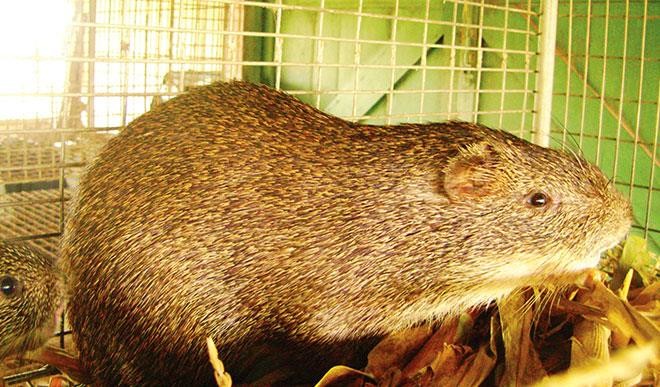Grasscutters, otherwise known as cane rats, are naturally found in the wild bush, but with passion, diligence and knowledge, they can be domesticated. Despite the notoriety and ferocity of the animals in the bush, grasscutter farmers have learnt to tame and rear them in farms and even at the backyard for home consumption and sale to consumers.
According to seasoned grasscutter farmers, it doesn’t take huge resources to start a small grasscutter farm but guts and some thousands of naira.
A grasscutter farmer, Mr. Dayo Oyebiyi, said the recent down turn in the nation’s economy has forced people to look for multiple sources of income, with grasscutter farming proving a reliable means.
Oyebiyi, who advised intending farmers to seek advice from experienced grasscutter farmers, said one can start on a small scale with just a colony of five, one male and four females, adding: “With about N50, 000 you can start a grasscutter farm in your backyard. All you need is either a cage constructed with wood and iron mesh or a hutch made of wood and galvanised iron sheets, which must be properly sheltered and protected.
“You can construct the house with bricks or cement blocks if you can afford it.” The farmer said that whichever form of housing that an intending farmer chooses, it must be properly ventilated with good roofing, enough height and good door with provision for adequate light and ant proof gutter.
“A grasscutter farmer must be careful in selection of good quality stock from established grasscutter farms. They can also be captured from the wild, but preferably young ones of between two and three months old that can be adapted.”
He said that grasscutters can be fed with a variety of feeds rich in carbohydrates, protein and vitamins such as grasses and food crops, which are not expensive, and feed supplements to promote healthy growth and development.
The farmer said that grasscutters hardly fall sick, advising that they must be treated with care and proper sanitation while farmers should watch out for signs of sickness in order to treat promptly.
“Market for grasscutters is everywhere in Nigeria, especially in the South-west where the animals are mostly reared.”
An adult grasscutter, he said, costs about N5, 000 and one might not spend up to 60% of that amount to raise the animal. “So, you can imagine the profit margin. The business is very lucrative.”
Another grasscutter farmer, Mr. Jacob Olaniyi, said: “You cannot rear grasscutter for two years and be poor. Grasscutter farming, though not very popular in some parts of the country, can be used for rural/urban poverty alleviation.”
He said that apart from protein provision for healthy living of consumers, grasscutter farming preserves the environment and encourages biodiversity as hunters don’t need to burn bushes searching for the animals.





Leave A Comment